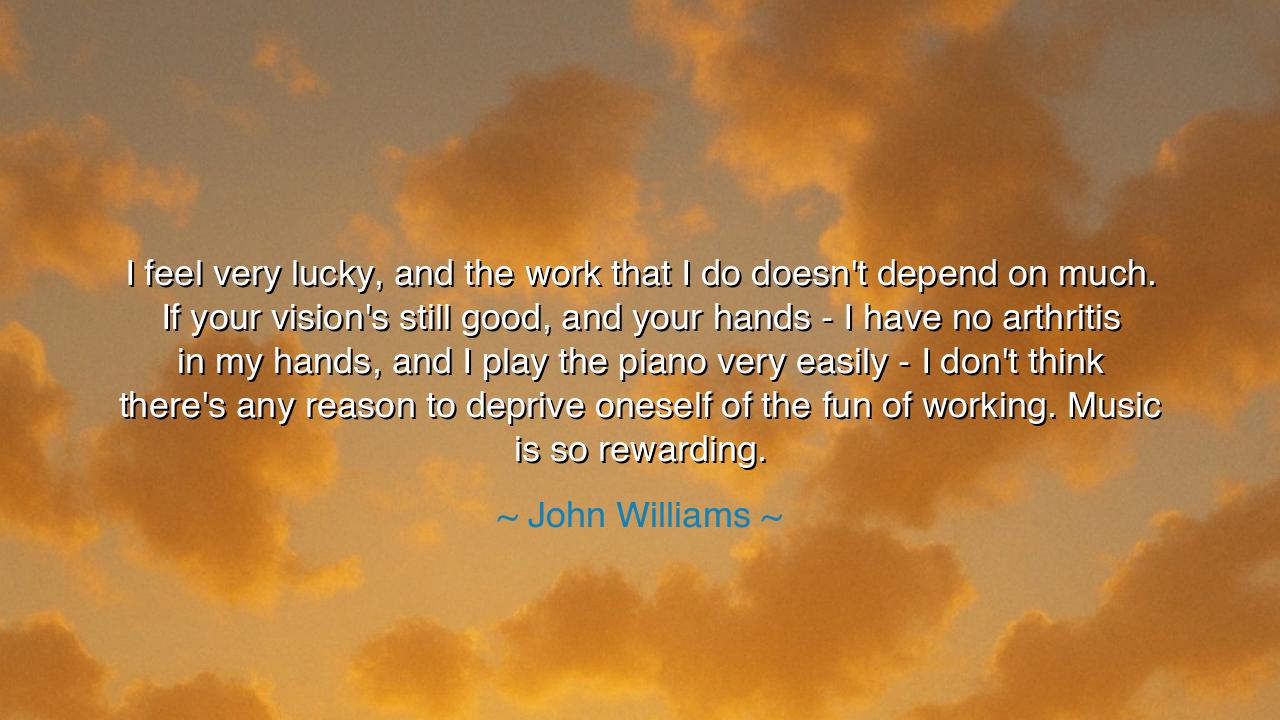
I feel very lucky, and the work that I do doesn't depend on
I feel very lucky, and the work that I do doesn't depend on much. If your vision's still good, and your hands - I have no arthritis in my hands, and I play the piano very easily - I don't think there's any reason to deprive oneself of the fun of working. Music is so rewarding.






Hear the words of the great composer John Williams, who said with humility and joy: “I feel very lucky, and the work that I do doesn’t depend on much. If your vision’s still good, and your hands—I have no arthritis in my hands, and I play the piano very easily—I don’t think there’s any reason to deprive oneself of the fun of working. Music is so rewarding.” These words, though spoken with simplicity, resound like a hymn of gratitude, teaching us the meaning of endurance, purpose, and the sacred delight of lifelong labor.
In his statement lies a profound truth: that the greatest gift a man can receive is not wealth nor glory, but the ability to continue in his calling. Williams does not boast of honors, nor of the multitudes who have been moved by his compositions. Instead, he speaks of hands still supple, of vision still sharp, of the quiet ability to sit at a piano and shape sound into beauty. This is the essence of luck as he sees it—not chance riches, but the preservation of health and skill that allows him to continue offering his art to the world.
There is also here the recognition that work, when rooted in passion, is not a burden but a fun and joyous pursuit. Too often men toil for wages alone, longing for rest, but Williams reminds us that the highest form of work is that which one would do regardless of reward. When the labor itself is nourishing, when the act itself brings delight, then work ceases to be an enemy and becomes a companion, a source of vitality even in old age. Thus, he speaks not of duty, but of joy: why would one deprive oneself of such a treasure?
History provides shining examples of this spirit. Consider Michelangelo, who even in his final years, aged and frail, continued to labor upon his sculptures and designs. When asked why he did not rest, he replied simply that his soul found life in his craft. To cease would be to die before death. So too did Johann Sebastian Bach compose until blindness overtook him, his last notes written in weakness yet filled with power. Like Williams, these men saw their art not as toil to be escaped, but as a reward in itself—a sacred fire that burned until their last breath.
The deeper meaning of Williams’ words is this: true fulfillment lies not in the external crowns of success, but in the inward joy of creation. The applause fades, the honors gather dust, but the act of shaping beauty endures as long as one’s body and spirit allow. He teaches us that if one is blessed with health, with strength, with hands that still move and eyes that still see, then one must not squander the gift by withdrawing into idleness. To create, to contribute, to remain faithful to one’s art is itself a form of gratitude.
This is a teaching for all, not just for musicians. Whatever your craft—be it writing, teaching, building, or nurturing—if you can still labor, still create, still offer your gift to others, do not deprive yourself of that joy. Work is not only about necessity; it is about meaning. And when you labor in love, your life becomes a song of purpose, each day adding another note to the melody of your existence.
Therefore, let us take this wisdom to heart. Cherish your health, care for your body, so that your hands and vision may serve you long. Do not despise your labor if it brings joy, but embrace it as one embraces a lifelong friend. See your craft not as an obligation to escape, but as a reward to be savored. For as Williams said, music is so rewarding—and by extension, so is every calling that stirs the soul.
Thus, we pass down his teaching: that life’s greatest blessing is not in being excused from work, but in being able to continue it with joy. Let each of us strive to live so, finding purpose not in rest alone, but in the sacred delight of creation, until the final day when our song is complete.






AAdministratorAdministrator
Welcome, honored guests. Please leave a comment, we will respond soon